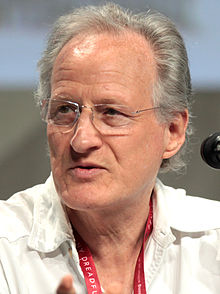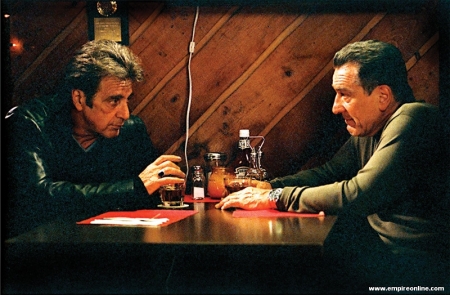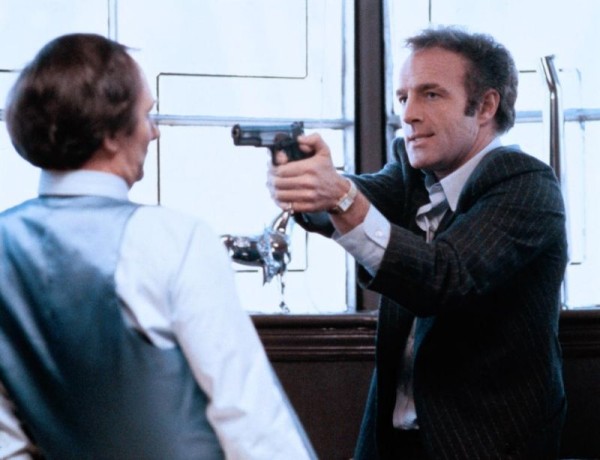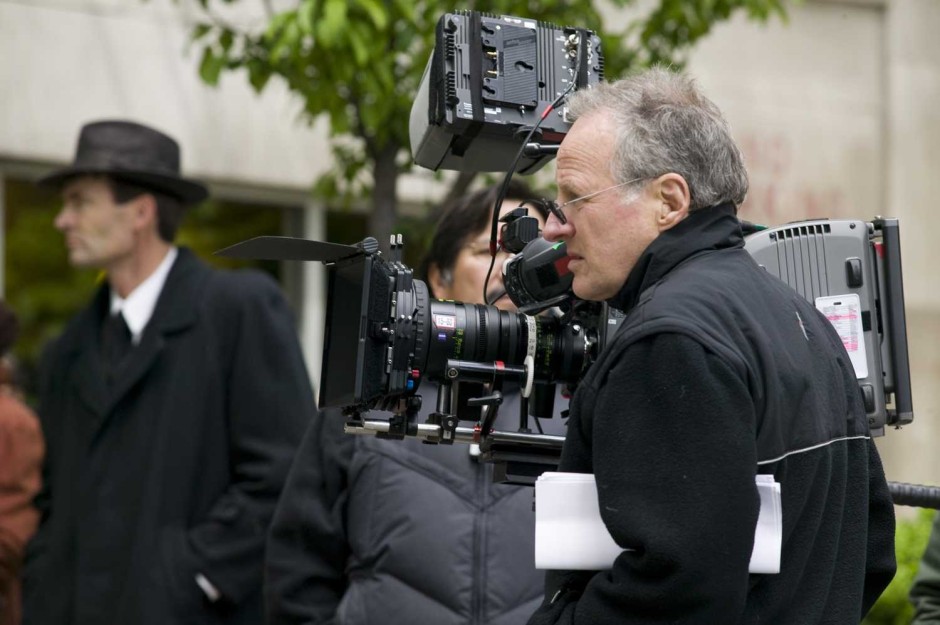The Hollywood director Michael Mann is renowned for edgy crime thrillers. In his stylish police procedurals, he creates milieus brimming with violence, intrigue and betrayal.
Mann’s body of work will be showcased by the Toronto International Film Festival in a retrospective, Neon Nights: The Films of Michael Mann, at the TIFF Bell Lightbox from February 5 to March 26.

A preview:
Heat (Feb. 19 and March 30), one of his finest movies, brings together two formidable talents, Robert De Niro and Al Pacino. De Niro plays Neil Macauley, a canny criminal, while Pacino portrays Vincent Hanna, a driven detective hot on his heels.
Hard-boiled and moody, Heat unfolds in Los Angeles. A gang of professional thieves, led by Neil Macauley (De Niro), robs an armoured car in broad daylight. Much to Macauley’s displeasure, one of the thieves, Waingro (Kevin Gage), kills all three guards, turning a routine robbery into something far bigger as far as the police are concerned.
In a fit of rage, Macauley sets upon Waingro, ready to beat him to a pulp, but a passing police cruiser distracts Macauley and allows Waingro to escape. Waingro, a sociopath, will turn up later in revenge mode.
Mann draws compelling portraits of the main protagonists.
Macauley is a ruthless, seasoned pro who has no personal attachments and will stop at nothing to achieve his goals. Pacino is tough-talking, profane and glowering.
The pair are perfect foils. Eventually, they meet — first in a coffee shop during which they exchange stories and tacit threats, and then in a tense night time showdown in a field adjacent to Los Angeles airport.

Heat is also about tangled personal relationships.
Hanna, several times divorced, is so utterly dedicated to his job that he neglects his girlfriend, Justine (Diane Venora), and maladjusted daughter.
Macauley, recently released from a long prison term, is something of a loner. But he gradually falls in love with Eady (Amy Brenneman), a bold but needy graphic artist.
The film is basically a cat-and-mouse game in which the good guys tail the bad guys. It turns more complicated and kinetic after Macauley’s motley gang robs a bank and Macauley, in an effort to exact vengeance, personally pursues a money launderer and Waingro.
The high point of the movie occurs in a wild shoot-out during which blood flows liberally in the streets of central Los Angeles. The scene is a classic of its kind.
Heat, released in 1995, has a lot of moving parts that mesh seamlessly. It’s a credit to Mann’s skills that he assembles them so effortlessly and expertly.
The cast is superb. De Niro, calm and collected, is a coiled mass of malevolent purpose. Pacino, explosive and gladhanding, is a man on the edge. Fine performances are also turned in by, among others, Val Kilmer as Macauley’s associate and John Voight as the gang’s steely fixer.
One can understand why Heat burnished Mann’s credentials as one of Hollywood’s most accomplished directors.
Thief (Feb. 5 and March 10) stars James Caan as Frank, a highly-skilled jewel thief and ex-con who works in a car dealership by day. As the movie opens, Frank is busy completing his latest “score.” He’s drilling into a bank vault containing the object of his desire: a cache of diamonds. As he breaks through the concrete wall, he allows himself a slight smile for a job well done.
As in Heat, the main character longs for love. Frank has acquired a girlfriend, Jesse (Tuesday Weld), but she’s naturally curious about his past and present. Finally, he divulges the details. He admits he’s a thief who’s spent time in jail.
“I’m just asking you to be with me,” he says plaintively.
She hesitates, still reeling from the enormity of Frank’s criminal record, before tearfully accepting his proposal. Strangely enough, there are no displays of affection between Frank and Jesse, nor is there any chemistry between Caan and Weld.
The film moves to a super-charged level when Frank, a freelance thief, is presented with a seemingly compelling proposition by Leo (Robert Prosky), a seasoned gangster. Leo, a motor mouth, offers to set up “scores” for him in exchange for a cut from the robberies. After Frank agrees to Leo’s terms, they stake out a building where the next robbery will take place.

Frank pulls off the job with military precision, but he’s unhappy with his “end” of the deal. Having received only a tenth of what he expected, he tells Leo he will no longer work for him. In a huff, Leo threatens Frank and Jesse. Frank, no cream puff, plans his revenge.
Thief, released in 1981, is not as ambitious a film as Heat, but it falls within the broad Mann genre. It’s taut and dark, seething with pent-up passions. And Caan delivers an understated and memorable performance.
The complete schedule:
USA 1981 | 124 min. | R
Looking to make one last big score and then get out of the game, safecracker Frank (James Caan) agrees to work for an avuncular mobster (Robert Prosky) offering a big payday for a high-profile job. Things don’t go as planned, and the lone wolf soon finds himself a hunted animal. As fully formed a debut as any in film history, Thief instantly established Mann’s cinematic hallmarks: his meticulous attention to detail, stylishly rendered visual and sonic environments (in the blue-tinted, rain-slick neon nights and pulsing electronic score by Tangerine Dream), expert action sequences, and hard but noble men displaying the utmost grace under pressure. Caan gives one of his defining screen performances as Frank, while Tuesday Weld is woundingly affecting as the woman he’s willing to give it all up for; the scene in a diner where they negotiate the terms of their relationship and the possibilities of their future together in the blunt terms of the underworld is a prototypical example of the filmmaker’s grittily realistic and wistfully romantic vision.
“One of the most intelligent thrillers I’ve seen.” (Roger Ebert)
February 5 & March 10
Manhunter
USA 1986 | 119 min. | R 35mm Archival Print!
Expert criminal profiler Will Graham (William L. Petersen) is called back from early retirement to help the FBI track down a serial killer dubbed “the Tooth Fairy.” Seeking insight into the killer’s mind, Graham consults the brilliant but deranged Dr. Hannibal Lektor (Brian Cox), whose apprehension nearly cost Graham his life — and his sanity. Blending high style with painstaking proceduralism, Mann’s adaptation of Thomas Harris’ novel Red Dragon established a narrative and visual template that would influence scores of contemporary TV crime dramas, from the Petersen-starring CSI to True Detective. The sinister realism that Brian Cox brings to his Lektor — as well as Tom Noonan’s intimidating physicality as the Tooth Fairy — set a new precedent for the serial-killer figure in contemporary pop culture, elevating it from slasher-film boogeyman to psychological enigma. 35mm print courtesy of UCLA Film & Television Archive.
“Manhunter ushered in the age of empathy for the devil.” (David Edelstein, Slate)
“One of the most impressive American thrillers of the late ’80s.” (Geoff Andrew, Time Out London)
February 6 & March 5
The Last of the Mohicans
USA 1992 | 114 min. | PG Director’s Cut!
Mann’s first movie memory was of the 1936 Randolph Scott film of The Last of the Mohicans, and his version of the musty tale accordingly owes far more to that previous cinematic incarnation than the original James Fenimore Cooper novel, which even in its own time was derided for its lack of authenticity. During the Seven Years’ War, noble warrior Hawkeye (Daniel Day-Lewis) works as a scout for the British along with his adoptive father Chingachgook (Russell Means) and brother Uncas (Eric Schweig). Rescuing and romancing a general’s daughter (Madeleine Stowe), Hawkeye soon finds himself at the centre of a plot by the duplicitous Magua (Wes Studi) to destroy the colonial invaders. Though inevitably hampered by the retrograde attitudes and representations of the source material, Mann’s Mohicans nevertheless gives its First Peoples characters (including the vengeful Magua) dimension and depth through its remarkable lead performances, with Day-Lewis dashingly embodying the stoic Hawkeye and actor activist Means bringing much-needed gravity to Chingachgook. The extraordinary period detail and stunningly staged battle scenes make Mohicans the rare epic to combine rigorous realism with eye-popping spectacle.
February 17
Heat
USA 1995 | 170 min. | R 35mm
Hard-boiled ex-con Neil McCauley (Robert De Niro) is the leader of a crew of seasoned stickup artists who operate with grim determination and military discipline. But when a last-minute replacement on his team leads to a bloody triple murder during an armoured truck robbery, McCauley is targeted by veteran detective Vincent Hanna (Al Pacino), whose fanatic dedication both mirrors and contrasts with McCauley’s ruthless professional expertise. Mann’s magnum opus ranks among the greatest crime films of all time, offering both an insider’s view of the games that cops and robbers play and finding powerful emotional resonance in the plight of those friends, lovers and family members trapped on the periphery of this closed world. While the virtuoso shootout sequence in the heart of downtown Los Angeles remains the film’s most iconic scene, the brilliantly underplayed coffee-shop confrontation between Hanna and McCauley — which marked Pacino and De Niro’s first time sharing the screen together — is the vital centre of Mann’s cinema, the culmination and summation of his perpetual themes.
February 19 & March 20
The Insider
USA 1999 | 156 min. | 14A 35mm
Based on the true story of Dr. Jeff Wigand — a chemist at tobacco giant Brown & Williamson who went on 60 Minutes to blow the whistle on his former employers and their professed ignorance of the addictive effects of smoking — The Insider is a brilliantly constructed and tautly told moral drama that explores both the rankest kinds of corporate greed and the always imperilled ethics of journalism. Russell Crowe stars as the conflicted Wigand, whose chance meeting with 60 Minutes producer Lowell Bergman (Al Pacino) leads him to endanger his family’s financial well-being, his future career prospects and, potentially, his life, in order to tell the truth about tobacco. Bergman, meanwhile, finds his principles put to the test when his own network — quailing before the threat of legal action — orders him to air a softer, heavily edited version of Wigand’s interview with Mike Wallace (Christopher Plummer). Exhilaratingly paced, brilliantly acted and morally complex, The Insider was Mann’s most acclaimed film, receiving nearly unanimous critical praise and seven Oscar nominations.
February 20
Ali
USA 2001 | 157 min. | 14A 35mm
Mann’s biopic of Muhammad Ali focuses on one of the most eventful periods of the legendary fighter’s life: the decade from 1964 to 1974 that saw him win the heavyweight belt from Sonny Liston, stripped of his title and threatened with imprisonment for his opposition to the Vietnam War and refusal to report to the draft board, and make an against-all-odds bid to regain the championship from George Foreman in the “Rumble in the Jungle” in Zaire. Will Smith underwent an astonishing physical transformation to play Ali, and impressively recreates both his deadly grace in the ring and the brash eloquence that earned him the nickname “the Louisville Lip”; he’s joined by a top-notch supporting cast including Jamie Foxx, Jeffrey Wright, Mario Van Peebles and Jon Voight (doing an astonishingly accurate impression of sportscaster Howard Cosell). Opening with one of Mann’s most indelible sequences — Ali’s training for the Liston bout intercut with a dynamic 1963 stage performance by Sam Cooke — Ali is “filled with vivid cameos and set to an infectious soul beat that effectively covers the underlying hum of calculated precision” (J. Hoberman, The Village Voice).
February 22
Collateral
USA 2004 | 120 min. | 14A 35mm
L.A. cabbie Max (Jamie Foxx) seems to have hit the jackpot when he’s hailed one evening by a nattily dressed businessman named Vincent (Tom Cruise), who offers him $600 to drive him to five appointments over the course of the night. At their first stop, however, Max discovers that Vincent’s business is murder, and he soon finds himself forced to play chauffeur to a hitman as Vincent traverses the city to make his bloody transactions. Returning to the crime-film territory he had made his own, Mann once again proves his mastery of action cinema with this taut thriller filled with dazzlingly choreographed violence, smooth-talking tough guys in slick suits, and the eerie iridescence of nighttime L.A. Cast against type, Cruise gives one of his most dynamic and ferocious performances as the ruthless assassin, while Foxx endows his everyman with charismatic amiability and all-too-believable vulnerability.
“This is a rare thriller that’s as much character study as sound and fury” (Roger Ebert).
March 12
Miami Vice
USA 2006 | 135 min. | 14A
Colin Farrell and Jamie Foxx take over from Don Johnson and Philip Michael Thomas as fast-living vice cops Crockett and Tubbs in Mann’s epic big-screen revamp of the TV series that made his name in the 1980s. When a FBI sting operation goes bloodily awry and one of their long-time informants winds up dead (along with his entire family), Crockett and Tubbs go deep undercover to infiltrate a transnational drug cartel. The super-cool super-cops soon discover that they are on to something much bigger than drug-smuggling — but personal and professional motives become dangerously intertwined when Crockett falls hard for the cartel kingpin’s right-hand woman (superstar Gong Li). Shooting exclusively on digital video for the first time, Mann and cinematographer Dion Beebe create a visual palette that ranges from swooningly gorgeous to brutally realistic; the sun, surf and speedboats gleam, while the astonishingly violent action sequences both shock and dazzle.
“Sensual and scary, the movie is so visually textured you feel as though you’re brushing against the screen” (Liam Lacey, The Globe and Mail).
March 13
Public Enemies
USA 2009 | 140 min. | 14A
In 1933, notorious outlaw John Dillinger (Johnny Depp) plies his bank-robbing trade in Chicago with the blessing of mob boss Al Capone, and finds romance with singer Billie Frechette (Marion Cotillard). When J. Edgar Hoover (Billy Crudup) transforms the Federal Bureau of Investigation into an elite, ultramodern interstate crime-fighting force with a mandate to tackle violent crime, Dillinger becomes their number-one target — but determined agent Melvin Purvis (Christian Bale) soon realizes that the only way to
capture a quarry like Dillinger is to blur the line between cop and criminal. Both minutely detailed in its period recreations and urgently contemporary in its slick digital-video sheen, Public Enemies plays like a Depression-era Heat, with Dillinger’s daring yet precise bank raids the tommygun-and-fedora equivalent of Neil McCauley’s high-tech robberies. Mann pushes his experiments with digital video further than ever, producing images both preternaturally crisp and intoxicatingly murky.
“A grave and beautiful work of art … [Mann is] helping change the way movies look” (Manohla Dargis, The New York Times).
March 26
